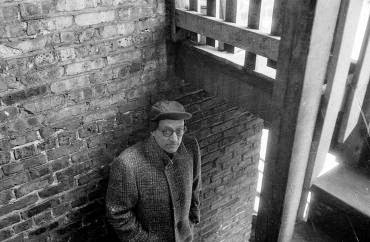Nelson Algren: Gambler, Hustler & Poet of The Neon Wilderness
This is Nelson Algren - writer, poet, gambler, hustler...
He saw the world from the bottom up instead of the top down. He chronicled the dregs, the underbelly, the parts of society that are more real than the gated suburban facade we know today.
He may have been born in Michigan, but Chicago was his town.
Train tracks were the arteries through which the blood of commerce flowed in and out of the great beating heart of his city.
Card games were, to him, like Shakespearean tragedies set on a Chiaroscuro lighted stage, obscured by layers of cheap cigar smoke and punctuated by the colorful language of losers and winners... mostly losers.
He mythologized his city in one great bustling skyscraper of a prose poem. Read Studs Terkel's introduction to 1951's Chicago: City On The Make.
Algren was arrested in 1933 for stealing a typewriter out of a Texas classroom. He served 5 months behind bars.
He won the 1st of his 3 O. Henry Awards in 1935... 2 years later.
In 1967, he was busted for marijuana possession. The charges were later dropped.
 |
| Simone de Beauvoir by Art Shay Chicago 1952 |
In 1947, Algren began an affair with the French writer and existential philosopher Simone de Beauvoir. Their relationship ended in 1950 because neither could forsake the city they loved.
Her next lover was Jean Paul Sartre, if that is any indication by comparison of Nelson Algren's intellectual prowess.
 |
| Nelson Algren and photographer Art Shay |
In 1956, Nelson Algren published his novel A Walk On The Wild Side. This novel is the source of Algren's "three rules of life": "Never play cards with a man called Doc. Never eat at a place called Mom's. Never sleep with a woman whose troubles are worse than your own."
A Walk On The Wild Side was adapted as a film in 1962 starring Jane Fonda.
The title sequence for the film was directed by Saul Bass, who also did the title sequence for Otto Preminger's 1955 film The Man With The Golden Arm.
This film was based on Nelson Algren's 1949 novel of the same name.
A Walk On The Wild Side also inspired a track on Lou Reed's 1972 album Transformer.
The song, produced by David Bowie, became one of Lou Reed's most commercially successful singles and received wide radio airplay despite several references to the debauched scene at Andy Warhol's New York studio "The Factory".
In 1947, Nelson Algren published his short story collection The Neon Wilderness.
In 1975, Nelson Algren moved to Paterson, New Jersey to work on an article about the murder trial of prize fighter Ruben "Hurricane" Carter.
He died on May 9, 1981 of a heart attack at his home in Sag Harbor, Long Island.
If there were a Mt. Rushmore of iconic Chicago writers, surely Nelson Algren's mug belongs up there along with Studs Terkel, Mike Royko, and Carl Sandburg.
Currently there are two crowd sourced documentaries about Nelson Algren making their way around the film festival circuit. Algren, whose popularity has waxed and waned throughout the years, is poised to be recognized and appreciated for the titan that he was. His spirit looms large over the literary landscape like a skyscraper rising out of a cornfield in the central plains. His poetry was the poetry of vagabonds, his stories were of the hard scrabble kind. He saw beauty in the bruised heart of a streetlamp hooker drenched in the little cat feet mist of a shrouded Chicago evening. He had no truck with politicos, rather he would have chosen the straight lie rather than the twisted trap of fools and knaves. His knuckles were busted from banging away like a conductor on some brokedown secondhand typewriter. His music was jazz and the improvisation of the streets. He was a king. He was a fool. He was the beating, pulsing artery through which the stories of those whose stories are generally ignored - were told. His books stand on library shelves with the dignity of sculpted pugilists who refuse to take the fall for love or money. As long as this rock keeps looping 'round the sun, they always will - for his was a truth that doesn't fall out of fashion. Even if his works are forgotten at various times, that says more about us than it does about him. In fact, his luminescence shines all the brighter in the shadows and the fog.















No comments:
Post a Comment